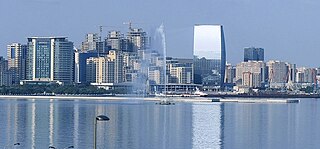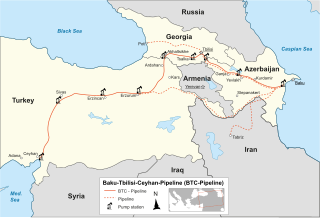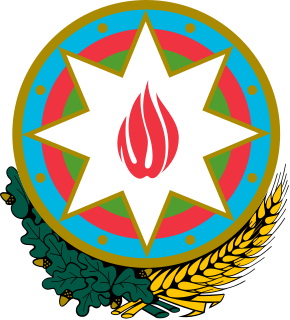Related Research Articles

Azerbaijan, officially the Republic of Azerbaijan, is a transcontinental country located at the boundary of Eastern Europe and Western Asia. It is a part of the South Caucasus region, and is bounded by the Caspian Sea to the east, Russia to the north, Georgia to the northwest, Armenia and Turkey to the west, and Iran to the south. Baku is the capital and largest city.

The economy of Azerbaijan has completed its post-Soviet transition into a major oil-based economy, from one where the state played the major role. The transition to oil production led to remarkable growth figures as projects came online; reaching 26.4% in 2005 and 34.6% in 2006 before subsiding to 10.8% and 9.3% in 2008 and 2009 respectively. The real GDP growth rate for 2011 was expected at 3.7% but had dropped to 0.1%. Large oil reserves are a major contributor to Azerbaijan's economy. The national currency, the Azerbaijani manat, was stable in 2000, depreciating 3.8% against the dollar. The budget deficit equaled 1.3% of GDP in 2000.

The economy of Bhutan is based on agriculture and forestry, which provide the main livelihood for more than 60% of the population. Agriculture consists largely of subsistence farming and animal husbandry. Rugged mountains dominate the terrain and make the building of roads and other infrastructure difficult. Bhutan is among the richest by gross domestic product (nominal) per capita in South Asia, at 3,491$ as of 2022, but it still places 153rd, and among the poorest in the world. The total gross domestic product is only 2,653$ million, and 178th according to IMF.

Baku is the capital and largest city of Azerbaijan, as well as the largest city on the Caspian Sea and of the Caucasus region. Baku is located 28 metres (92 ft) below sea level, which makes it the lowest lying national capital in the world and also the largest city in the world located below sea level. Baku lies on the southern shore of the Absheron Peninsula, alongside the Bay of Baku. Baku's urban population was estimated at two million people as of 2009. About 25% of all inhabitants of the country live in Baku's metropolitan area. Baku is the sole metropolis in Azerbaijan.

In ancient times, Maldives were renowned for cowries, coir rope, dried tuna fish, ambergris (maavaharu) and coco de mer (tavakkaashi). Local and foreign trading ships used to load these products in the Maldives and bring them abroad.

The Baku–Tbilisi–Ceyhan (BTC) pipeline is a 1,768 kilometres (1,099 mi) long crude oil pipeline from the Azeri–Chirag–Gunashli oil field in the Caspian Sea to the Mediterranean Sea. It connects Baku, the capital of Azerbaijan and Ceyhan, a port on the south-eastern Mediterranean coast of Turkey, via Tbilisi, the capital of Georgia. It is the second-longest oil pipeline in the former Soviet Union, after the Druzhba pipeline. The first oil that was pumped from the Baku end of the pipeline reached Ceyhan on 28 May 2006.

Azerbaijanis or Azeris, also known as Azerbaijani Turks, are a Turkic people living mainly in northwestern Iran and the Republic of Azerbaijan, with a mixed heritage of Caucasian, Iranian and Turkic elements. They are the second-most numerous ethnic group among the Turkic-speaking peoples after Turkish people and are predominantly nominal Shia Muslims. They comprise the largest ethnic group in the Republic of Azerbaijan and the second-largest ethnic group in neighboring Iran and Georgia. They speak the Azerbaijani language, belonging to the Oghuz branch of the Turkic languages.

The main religion in Azerbaijan is Islam, though Azerbaijan is the most secular country in the Muslim world. Estimates include 96.9% and 99.2% of the population identifying as Muslim. Most are adherents of Shia Islam, with a minority (15%) being Sunni, differences traditionally have not been defined sharply. Most Shi'a are adherents of orthodox Ithna Ashari school of Shi'a Islam. Following many decades of Soviet atheist policy, religious affiliation is nominal in Azerbaijan and Muslim identity tends to be based more on culture and ethnicity than religion. Traditionally villages around Baku and Lenkoran region are considered stronghold of Shi'ism. In some northern regions, populated by Dagestani (Lezgian) people, Sunni Islam is dominant.
Azeri–Chirag–Gunashli or Azeri–Chirag–Deepwater Gunashli is a complex of oil fields in the Caspian Sea, about 120 kilometres (75 mi) off the coast of Azerbaijan. It consists of the Azeri and Chirag oil fields, and the deepwater portion of the Gunashli oil field. An overall estimate of the area of the development is 432.4 square kilometres (167.0 sq mi). It is developed by the Azerbaijan International Operating Company, a consortium of international oil companies, and operated by BP on behalf of the consortium. The ACG fields have estimated recoverable reserves of about 5 to 6 billion barrels of petroleum. Peak oil production of 835,000 barrels per day (132,800 m3/d) was reached in 2010, however by the first quarter of 2022 production had declined to 434,000 barrels per day (69,000 m3/d), or about one-half of peak value. As of 2021, ACG oil accounted for 95% of all Azerbaijani oil exports.

Christianity in Azerbaijan is a minority religion. Christians who estimated between 280,000 and 450,000 (3.1%–4.8%) are mostly Russian and Georgian Orthodox and Armenian Apostolic. There is also a small Protestant Christian community which mostly came from Muslim backgrounds.

The Baku–Tbilisi–Kars (BTK), or Baku–Tbilisi–Akhalkalaki–Kars railway (BTAK), is an international rail link project connecting Azerbaijan, Georgia and Turkey, which became operational on 30 October 2017 following several years of delays. The project was originally due to be completed by 2010, but was delayed to 2013, 2015, 2016, and, following a fifth trilateral meeting in February 2016, foreign ministers of the three countries announced that the railway would finally be completed in 2017.

The Caspian Sea is the world's largest inland body of water, often described as the world's largest lake or a full-fledged sea. An endorheic basin, it lies between Europe and Asia; east of the Caucasus, west of the broad steppe of Central Asia, south of the fertile plains of Southern Russia in Eastern Europe, and north of the mountainous Iranian Plateau of Western Asia. It covers 143,550 sq mi (372,000 km2) and a volume of 78,200 km3 (19,000 cu mi). It has a salinity of approximately 1.2%, about a third of the salinity of average seawater. It is bounded by Kazakhstan to the northeast, Russia to the northwest, Azerbaijan to the southwest, Iran to the south, and Turkmenistan to the southeast.

Bilateral relations exist between the Republic of Azerbaijan and Japan in the political, socio-economic, cultural, and other fields.
Energy in Azerbaijan describes energy and electricity production, consumption and export in Azerbaijan.

Visitors to Azerbaijan must obtain a visa from one of the Azerbaijani diplomatic missions unless they come from one of the visa-exempt countries, countries eligible for visas on arrival or countries eligible for electronic visas. Visitors must hold passports that are valid for at least 3 months beyond the intended period of stay.

Nootsara Tomkom is a Thai volleyball player. She has been selected to play for the Thailand women's national volleyball team 39 times.
The Greeks in Azerbaijan have not formed a large community in comparison to those in neighbouring Georgia and Armenia. It was composed mainly of Pontic Greek immigrants from the Ottoman Empire.
The relationship between Azerbaijan and Organization of the Black Sea Economic Cooperation dates back to 1992 when Azerbaijan signed Istanbul Summit Declaration and the Bosphorus Statement.
The economic history of Azerbaijan is a historical review of the development of the Azerbaijani economy from the beginning of the 20th century to the modern economy of the Republic of Azerbaijan.

Azerishiq is the Baku electrical grid operator.
References
- 1 2 Asian Development Bank, "Poverty in Azerbaijan", Asian Development Bank , Manila, 13 February 2020. Retrieved on 13 February 2020.
- ↑ Special Correspondent, "Poverty, repression in shadow of Azerbaijan's shiny new skyline", France24 , Baku, 8 April 2019. Retrieved on 13 February 2020.
